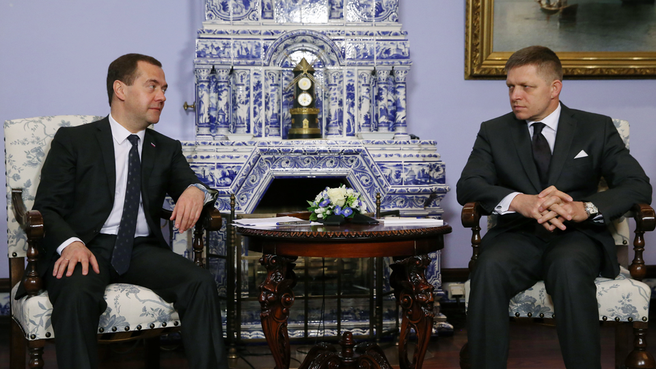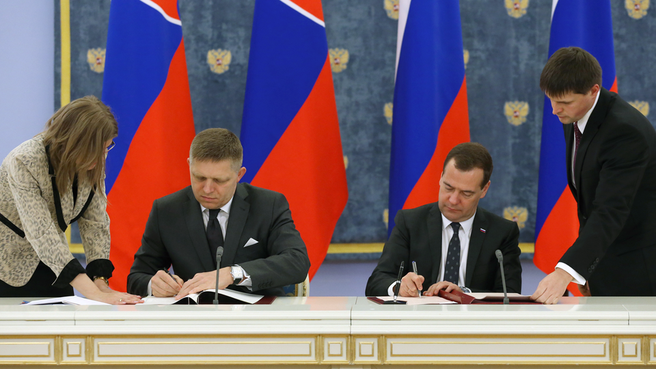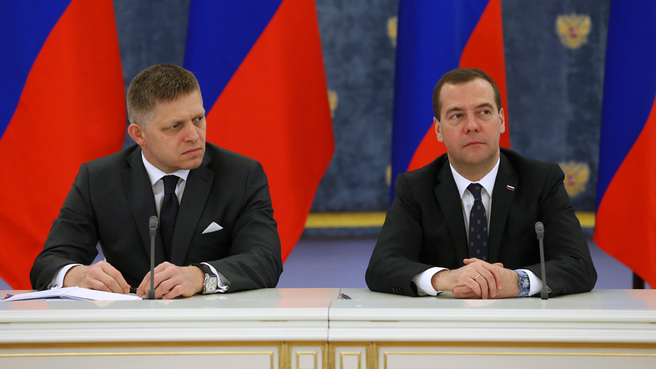Dmitry Medvedev has held talks with Slovak Prime Minister Robert Fico
Dmitry Medvedev’s meeting with Slovak Prime Minister Robert Fico
Documents signed following the meeting
News conference following the talks
Dmitry Medvedev’s meeting with Slovak Prime Minister Robert Fico
The meeting’s opening remarks:
Dmitry Medvedev: Mr Prime Minister, I am very pleased with this meeting. We have met at different times and in different capacities, but this does not change our good relations. In this context, I would like to recall my visit to Slovakia in 2010 and a number of other events that we held together. Now is not the easiest of times either, so it’s natural and good that you have come to discuss prospects for Russian-Slovak cooperation. I heartily welcome you.
Robert Fico (via interpreter): Thank you very much, Mr Prime Minister. First of all, I would like to thank you for your sincere welcome and hospitality –Slavic hospitality that has been accorded me and my delegation. Slovak-Russian relations are not encumbered by any outstanding issues. On the contrary, we are connected by a large number of historical events. I would also like to thank you for the invitation to participate in the celebrations devoted to the end of World War II and the victory over Nazism. These events are deeply ingrained in our memory; they are in the hierarchy of our values and we will stay the course in the future. Although we do not have any unresolved issues, we are meeting in a difficult economic situation. It is affecting our economic ties. I am certainly not happy to say that trade turnover between our countries is falling. So, in our very first meetings, we will prioritise the practical aspects of our economic relations. Yesterday, I had an opportunity to meet with Mr Yakunin, President of Russian Railways, with whom we discussed specific projects.
<…>
Documents signed following the talks
Following their talks, Dmitry Medvedev and Robert Fico signed an Agreement on Cooperation between the Government of the Russian Federation and the Government of the Slovak Republic in Fighting Illegal Migration.
The prime ministers also attended the ceremony of signing of the following documents:
- Memorandum on Mutually Beneficial Cooperation between the Doronichi Agro-Industrial Group and the Slovak-Russian Business Council;
- Agreement on Cooperation in the Research and Design, Manufacturing and Promotion of Medicines between the Novouralsky Biomedical Research and Innovation Technology Park and MEDIKarim s. r. o.;
- Agreement on Cooperation between the Russian Trade Union of Railway and Transport Construction Workers (Rosprofzhel) and Spa Turčianske Teplice;
- Memorandum on Cooperation between the Federal Passenger Company and the Slovak-Russian Business Council;
- Memorandum on Cooperation between Russian Railways (RZD) and Railways of the Slovak Republic (ŽSR) for the further development of railway freight transit via European transport corridors;
- Agreement on Cooperation between the Vladimir Region Development Corporation and the Slovak Investment and Trade Development Agency (SARIO);
- Agreement on Cooperation between the Business Council for Cooperation with Slovakia and the Slovak-Russian Business Council;
- Memorandum on Cooperation between the Federal Agency for Tourism of the Russian Federation and the Slovak Tourist Board (SACR);
- Memorandum of Understanding on Cooperation in Standardisation, Metrology and Conformity Assessment between the Federal Agency for Technical Regulation and Metrology (Rosstandart) and the Slovak Office of Standards, Metrology and Testing;
- Memorandum of Understanding on holding a subsidies (grants) tender as part of Russian-Slovak research and technical cooperation;
- Memorandum on Cooperation between the Russian Ministry of Agriculture and the Slovak Ministry of Agriculture and Rural Development for modernising their agricultural industries.
News conference following the talks
Excerpt from the transcript:
Dmitry Medvedev:
The talks with Slovak Prime Minister Robert Fico have reaffirmed our desire to actively develop bilateral cooperation regardless of any momentary considerations. An impressive array of documents has just been signed. These include intergovernmental agreements, corporate documents in the sphere of transport, agriculture, science and tourism, and agreements between our companies.
Despite the rather difficult situation, we continue our active cooperation, and in this context I would like to note the Prime Minister’s personal efforts.
I would particularly like to express gratitude to the Slovak people and the Slovak leadership for the care they show toward memorials to the liberation of Slovakia from the Nazis, which unite us.
Our trade cooperation is developing steadily but unevenly, due to external factors. Last year, trade fell by as much as 20 per cent, while in the first three months of this year the decline was even more serious. Obviously, all of this is only damaging our economies.
We should work not only to stimulate trade but also develop investment cooperation. The intergovernmental commission has drafted such projects in a number of sectors.
Today, we discussed various projects that can boost our cooperation. They relate to energy – with gas being the most difficult and important subject, nuclear energy, industry, infrastructure and agriculture.
We also agreed on joint grants to support a number of technical research projects. These agreements are reflected in the memorandums between our education ministries. Furthermore, we discussed student internship programmes and the possibility of increasing quotas for such programmes.
Robert Fico(via interpreter): There are no unresolved issues between Slovakia and Russia. However, our economic relations are affected by the difficult economic situation. Statistics confirm the decline in our trade. Neither the interests of the Slovak Republic nor the Russian Federation are served by the decline of our trade and economic relations. Yesterday, we addressed specific issues that arose between representatives of the Slovak business community and Russian Railways. I believe that the agreements we have reached will eliminate the negative effects that we have felt in Slovakia.
We devoted the greater part of our talks to gas. The Slovak Republic is well aware of the fact that, come January 2020, the agreement on gas transit to Slovakia via Ukraine will expire. If we are not a transit country for gas to Europe our budget will sustain significant losses. So we submitted to Russia our project, Eastring, which should be a joint project between countries such as Bulgaria, Romania, Hungary and Slovakia with the participation and support of the European Union, and it would be connected with the Russian-Turkish project, which will be launched in 2016. Each Slovak government should see to it that Slovakia’s gas pipeline is never empty.
The next important subject that we addressed was cooperation in the nuclear sphere. After the construction of the third and fourth units is completed, Slovakia will have six nuclear reactors. According to an international expert review, the four Slovak reactors are considered among the safest.
We also discussed the subject of processing spent nuclear fuel and agreed with the economy minister that it should be analysed in depth, and the same applies to gas storage in the Slovak Republic. We also touched on the question of the cyclotron. We asked Russia to propose a possible use for this equipment, which is currently in the city of Dubna. Nor did we fail to discuss defence cooperation. I would like to reaffirm Slovakia’s interest in modernising the S 300 [surface to air missile] system. I hope that an agreement on the upgrade and maintenance of Mi 17 helicopters and other equipment in Slovakia will be signed soon.
At the end of our visit, we will take a look at Russian aircraft, such as the Tu [Tupolev] and Sukhoi.
Talks at the level of the International Investment Bank, where a great deal of projects were presented that should be funded from this financial source, were very interesting.
A number of memorandums and agreements that we signed are based on the results of the 17th meeting of the intergovernmental commission that took place in May. We are determined to overcome the decline in our trade and economic relations, which in the past three months hit 40 per cent.
Excerpts from answers to media questions:
Dmitry Medvedev: We never prioritise the issue of sanctions for one simple reason – we did not impose them and it is not up to us to lift them. This is up to our trading partners, primarily in Europe, which has indeed been hurt by these sanctions. My colleague and I have cited figures regarding the decline in trade – to a very large extent it is due to trade sanctions. Let those who devised, enforced and promoted these sanctions and are now proposing to preserve them for the future think about this.
Our EU partners will meet in July, and we will respond symmetrically to any new decisions that are taken. If no decisions are taken we will stay the course. This approach is always used in international relations. And all this is despite the fact that we have advanced and very good relations with a whole number of EU states. Some states have been significantly affected by these sanctions. Nevertheless, the EU bears collective responsibility, and all EU states should understand this.
Robert Fico (via interpreter): Slovakia is an EU member and we support the [EU’s] common position regarding the situation in Ukraine. We believe in unity, but as a sovereign state, we retain the right to uphold our national interests without jeopardising the EU’s unity and its united position. The Slovak Republic wants Ukraine to be a functional and stable state. We do not want Ukraine to become another Libya or Iraq, because it is our immediate neighbour.
The Slovak government has always considered EU sanctions as just a tool, not a political solution. The implementation of the Minsk agreements is important to us – implementation on both sides. If we see implementation, then we will support the lifting of sanctions as part of this implementation process.
I believe it is very important that during our talks today we made every effort to give a fresh start to our trade and economic relations.
<…>
Dmitry Medvedev: Turkish Stream originated as a project because our European partners stymied South Stream. Some of them are sorry now.
Turkish Stream is a full-fledged, major project. We are interested in creating a solid legal framework for it; all the documents are being prepared and everything is well in this regard. Basic agreements to this effect have been reached with the Turkish leadership. So today we discussed the feasibility of the options that Turkish Stream creates, after gas reaches the Greek border, for European states and the possible involvement of our Slovak partners in these processes, including as part of the Eastring project. We are willing to assess what is being proposed to us and estimate the required capacities and financing. All of this will be linked to progress on Turkish Stream, and this project, indeed, is beginning to get off the ground.
Regarding the risks, there are risks in any commercial project. However, the implementation of this project is based on the agreements that have been achieved. Therefore, we believe that all is well in this respect, unlike the situation around South Stream, where, unfortunately, at a certain point we had to take a tough decision and terminate it.
Robert Fico (via interpreter): Slovakia cannot influence trade and economic relations between Russia and Ukraine. Nor can we sit on the fence and wait until Ukraine drops out of the gas transit system, since this affects Slovakia. So the Eastring project will become increasingly relevant as the Russian-Turkish project moves ahead. However, we can only implement such projects after reaching agreements between the four countries, as well as with the participation of the Russian Federation. Searching for alternative ways of resolving this issue is the only responsible course of action.















